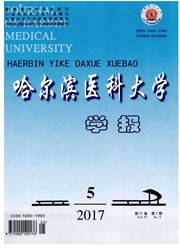

 中文摘要:
中文摘要:
目的探讨模拟微重力对PC12细胞衰老的影响及相关机制。方法用旋转细胞培养系统进行模拟微重力条件下的细胞培养。选取模拟微重力和正常重力条件下培养6h,12h,24h,48h,72b和96h的PC12细胞作为研究对象。流式细胞仪检测PC12细胞各个细胞周期分布的变化;Westernblot方法检测PC12细胞P53蛋白的变化;生化反应试剂盒检测活性氧变化;衰老相关B半乳糖苷酶(SA-13-gal)特异性染色对衰老的PC12细胞进行评估。结果细胞周期分析的结果显示,经过模拟微重力培养的PC12细胞其细胞周期阻滞在G1期。在模拟微重力培养96h细胞周期蛋白P53表达均升高。SA—B—gal染色的结果显示在模拟微重力的作用下,PC12细胞SA—B—gal的活性随着模拟微重力培养时间的延长而逐步升高。PC12细胞内H2O2的水平升高,并且具有时间依赖性。模拟微重力细胞培养上清中的H2O2:也相应升高,但是滞后于细胞内的H2O2。结论①模拟微重力可以引起PC12细胞SA-13-g.1的活性升高,G1期细胞周期阻滞和P53的活化;②模拟微重力条件下诱导PC12细胞衰老可能通过氧化应激实现。
 英文摘要:
英文摘要:
Objective To investigate the effect of simulated microgravity on. cellular senes cence of PC12 cells and its mechanism. Methods The microgravity environment was simula ted by a rotary cell culture system, PC12 cells were cultured under simulated microgravity and normal gravity for6 h, 12 h, 24 h, 48 h, 72 h and96 h. Cell cycle (GO/G1, S, and G2/M) distribution was determined by flow cytometry. P53 protein was detected by Western blot. The activities of n2 02 were detected by chemistry reaction Kit. Senescenceassociated galactosi dase (SA-β-gal) was employed to distinguish the senescentPC12 cells. Results There was a G1 phase arrest in the cell cycle of simulated microgravity cultured PC12 cells. The expressionof P53 was increased on 96 h of microgravity cuhure. The SA-β-galactivity was upregulated with simulated microgravity culture gone on. The amount of H202 was also increased in the sim ulated microgravity cultured PC12 cells in a timedependent manner. Conclusion (1) Simula ted microgravity induces SA-β-gal activity, arrests PC12 ceils in the G1 phase and activates P53 protein; (2) Simulated microgravity promotes PC12 cell senescence probably via oxidant stress.
 同期刊论文项目
同期刊论文项目
 同项目期刊论文
同项目期刊论文
 期刊信息
期刊信息
